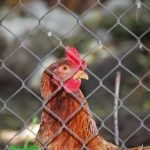Keeping pigeons and chickens together is a long-standing practice that offers numerous advantages for small-scale farmers and homesteaders. Both species provide valuable resources: pigeons are raised for their meat, eggs, and fertilizer, while chickens are primarily kept for eggs, meat, and natural pest control. When housed together, these birds can create a symbiotic relationship that enhances the overall productivity of a small farm or backyard operation.
Although pigeons and chickens have distinct requirements and behavioral patterns, they can coexist successfully with proper planning and management. This article will examine the benefits of raising pigeons alongside chickens and provide detailed information on housing arrangements, nutritional needs, health maintenance, disease prevention, and effective strategies for managing interactions between the two species. By understanding the unique characteristics and needs of both pigeons and chickens, farmers and homesteaders can create an efficient and harmonious environment that maximizes the potential of both bird species.
This approach can lead to increased resource production, improved pest control, and a more diverse and sustainable small-scale farming operation.
Table of Contents
- 1 Benefits of Keeping Pigeons with Chickens
- 2 Housing and Coop Considerations for Pigeons and Chickens
- 3 Feeding and Nutrition for Pigeons and Chickens
- 4 Health and Disease Management for Pigeons and Chickens
- 5 Managing Interactions between Pigeons and Chickens
- 6 Conclusion and Tips for Successfully Keeping Pigeons with Chickens
- 7 FAQs
- 7.1 What are the benefits of keeping pigeons with chickens?
- 7.2 What should be considered before keeping pigeons with chickens?
- 7.3 How can pigeons and chickens coexist peacefully?
- 7.4 What are some potential challenges of keeping pigeons with chickens?
- 7.5 Are there any specific breeds of pigeons or chickens that are better suited for cohabitation?
Key Takeaways
- Keeping pigeons with chickens can be beneficial for both species, as they can help each other with pest control and provide companionship.
- Pigeons and chickens can share the same housing and coop, but it’s important to provide separate nesting areas and perches to prevent conflicts.
- Both pigeons and chickens have different dietary needs, so it’s important to provide a balanced diet for each species to ensure their health and well-being.
- Regular health checks and disease management are crucial for both pigeons and chickens to prevent the spread of illnesses and maintain a healthy flock.
- Managing interactions between pigeons and chickens is important to prevent aggression and ensure a harmonious coexistence, such as providing enough space and monitoring their behavior.
Benefits of Keeping Pigeons with Chickens
Complementary Roles
Pigeons are excellent foragers and can help control pests such as insects and weeds. They also produce nutrient-rich manure that can be used to fertilize the soil, promoting healthy plant growth. Additionally, pigeons are prolific breeders and can provide a sustainable source of meat and eggs for the farm.
Chickens: Pest Control and Egg Production
Chickens, on the other hand, are known for their pest control abilities, particularly in controlling insects and small rodents. They also provide a steady supply of eggs and meat, making them a valuable addition to any small farm or homestead.
A More Sustainable and Diverse Farming System
By keeping pigeons and chickens together, farmers can maximize the benefits of both species, creating a more sustainable and diverse farming system. The presence of both pigeons and chickens can contribute to a more balanced ecosystem on the farm, with each species playing a unique role in maintaining the overall health and productivity of the environment.
Housing and Coop Considerations for Pigeons and Chickens

When keeping pigeons with chickens, it’s important to provide suitable housing and coop considerations for both species. Pigeons require a loft or dovecote that provides ample space for flying and roosting. The loft should be well-ventilated and protected from predators, with nesting boxes or shelves for breeding pairs.
Additionally, pigeons need access to grit and minerals to aid in digestion and overall health. Chickens, on the other hand, require a secure coop that protects them from predators and provides adequate space for roosting and nesting. The coop should also have good ventilation and natural light to promote healthy living conditions.
Both pigeons and chickens benefit from access to outdoor space for foraging and exercise, so it’s important to provide a secure run or free-range area where they can roam safely. When housing pigeons and chickens together, it’s essential to consider their different needs and behaviors. For example, pigeons may be more comfortable roosting at higher elevations, while chickens prefer lower roosts.
Providing separate roosting areas within the same structure can help accommodate these differences. Additionally, ensuring that both species have access to clean water and suitable nesting areas is crucial for their overall well-being.
Feeding and Nutrition for Pigeons and Chickens
Feeding and nutrition are essential aspects of keeping pigeons with chickens. Pigeons are primarily grain-eating birds and require a diet rich in seeds such as wheat, barley, corn, and peas. They also benefit from access to grit and minerals to aid in digestion and overall health.
Additionally, pigeon breeders may supplement their birds’ diet with specialized pigeon feed that provides essential nutrients for breeding pairs and growing chicks. Chickens have different dietary requirements and benefit from a balanced diet that includes a mix of grains, protein sources such as insects or commercial feed, and access to fresh greens. Providing chickens with access to grit is also important for their digestive health, as it helps them break down food in their gizzards.
Additionally, ensuring that chickens have access to calcium sources such as oyster shells is crucial for egg production and overall health. When feeding pigeons and chickens together, it’s important to consider their different dietary needs and behaviors. For example, pigeons may prefer to feed at different times than chickens, so providing separate feeding areas can help prevent competition for food.
Additionally, ensuring that both species have access to clean water at all times is crucial for their overall health and well-being.
Health and Disease Management for Pigeons and Chickens
Maintaining the health of pigeons and chickens is essential when keeping them together. Both species are susceptible to a range of diseases and parasites that can impact their well-being if not properly managed. Regular observation and monitoring of the birds’ behavior and physical condition can help identify potential health issues early on.
Pigeons are susceptible to diseases such as coccidiosis, salmonellosis, and respiratory infections. Regular cleaning of the loft, providing clean bedding material, and ensuring good ventilation can help prevent the spread of diseases among pigeons. Additionally, providing a balanced diet and access to clean water is crucial for maintaining their overall health.
Chickens are also vulnerable to diseases such as coccidiosis, infectious bronchitis, and external parasites like mites and lice. Maintaining a clean coop environment, providing regular dust baths for the chickens, and practicing good biosecurity measures can help prevent the spread of diseases among the flock. Additionally, ensuring that chickens have access to a balanced diet and clean water is crucial for their overall health and immune function.
When keeping pigeons with chickens, it’s important to practice good biosecurity measures to prevent the spread of diseases between the two species. This includes quarantining new birds before introducing them to the existing flock, practicing good hygiene when handling birds or their equipment, and regularly cleaning and disinfecting the coop and loft. By implementing these measures, farmers can help maintain the health and well-being of both pigeons and chickens.
Managing Interactions between Pigeons and Chickens

Understanding Behavioral Differences
While pigeons and chickens can coexist harmoniously, it’s essential to consider their different behaviors and social dynamics. Pigeons are generally peaceful birds that prefer to roost at higher elevations, whereas chickens are more ground-dwelling birds that establish pecking orders within the flock.
Accommodating Behavioral Differences
Providing separate roosting areas within the same structure can help accommodate these differences in behavior. Additionally, ensuring that both species have access to suitable nesting areas can help prevent competition for breeding sites. When introducing new birds to an existing flock, it’s important to monitor their interactions closely to ensure that they integrate smoothly without causing undue stress or aggression.
Managing Resources and Preventing Conflicts
It’s also important to consider the potential for competition over food resources between pigeons and chickens. Providing separate feeding areas or feeding at different times can help prevent conflicts over food. Additionally, ensuring that both species have access to clean water at all times is crucial for their overall well-being.
By understanding the behaviors of pigeons and chickens and providing suitable accommodations for their interactions, farmers can successfully keep these two bird species together in the same environment.
Conclusion and Tips for Successfully Keeping Pigeons with Chickens
In conclusion, keeping pigeons with chickens can provide a range of benefits for small-scale farmers or homesteaders. By understanding the complementary nature of these two bird species and providing suitable housing, feeding, health management, and accommodations for their interactions, farmers can create a more sustainable and diverse farming system. Some tips for successfully keeping pigeons with chickens include: 1.
Providing suitable housing that meets the needs of both pigeon loft space and chicken coop space.
2. Offering a balanced diet that meets the specific nutritional requirements of both pigeons and chickens.
3. Practicing good biosecurity measures to prevent the spread of diseases between the two species.
4.
Monitoring interactions between pigeons and chickens closely to ensure they coexist harmoniously.
5. Providing access to clean water at all times for both pigeon loft space and chicken coop space. By following these tips and considering the unique needs of both pigeon loft space and chicken coop space, farmers can successfully keep pigeons with chickens in a way that maximizes the benefits of both species while promoting a more sustainable farming system overall.
If you’re considering keeping pigeons with chickens, you may also be interested in learning about the best kind of coop for chickens. Check out this article on what kind of coop is best for chickens to ensure that your feathered friends have the ideal living space.
FAQs
What are the benefits of keeping pigeons with chickens?
Keeping pigeons with chickens can provide several benefits. Pigeons can help control pests such as flies and other insects around the chicken coop. They can also help keep the chicken coop clean by eating spilled feed and other debris. Additionally, pigeons can provide companionship for the chickens and contribute to a diverse and dynamic farm environment.
What should be considered before keeping pigeons with chickens?
Before keeping pigeons with chickens, it’s important to consider the space available in the coop and run. Pigeons and chickens should have separate roosting and nesting areas to prevent any potential conflicts. Additionally, it’s important to ensure that the pigeons and chickens have access to separate food and water sources to prevent competition and ensure that each species receives the proper nutrition.
How can pigeons and chickens coexist peacefully?
Pigeons and chickens can coexist peacefully by providing adequate space and resources for both species. It’s important to monitor the interactions between pigeons and chickens to ensure that there is no aggression or competition for resources. Providing enrichment activities and environmental stimuli can also help reduce any potential conflicts between the two species.
What are some potential challenges of keeping pigeons with chickens?
One potential challenge of keeping pigeons with chickens is the risk of disease transmission between the two species. It’s important to monitor the health of both pigeons and chickens and practice good biosecurity measures to prevent the spread of diseases. Additionally, some chickens may be aggressive towards pigeons, so it’s important to monitor their interactions and provide separate spaces if necessary.
Are there any specific breeds of pigeons or chickens that are better suited for cohabitation?
There are no specific breeds of pigeons or chickens that are inherently better suited for cohabitation. However, it’s important to consider the temperament and behavior of individual birds when introducing them to a mixed-species environment. Some breeds of pigeons and chickens may be more docile and adaptable, making them better candidates for cohabitation.
Meet Walter, the feathered-friend fanatic of Florida! Nestled in the sunshine state, Walter struts through life with his feathered companions, clucking his way to happiness. With a coop that’s fancier than a five-star hotel, he’s the Don Juan of the chicken world. When he’s not teaching his hens to do the cha-cha, you’ll find him in a heated debate with his prized rooster, Sir Clucks-a-Lot. Walter’s poultry passion is no yolk; he’s the sunny-side-up guy you never knew you needed in your flock of friends!







